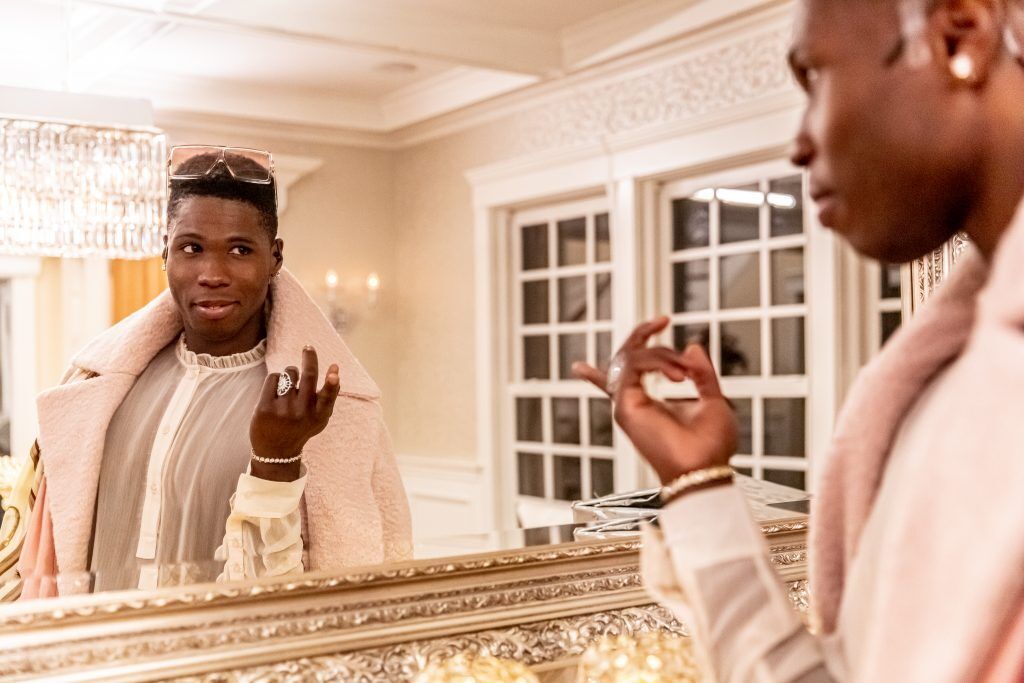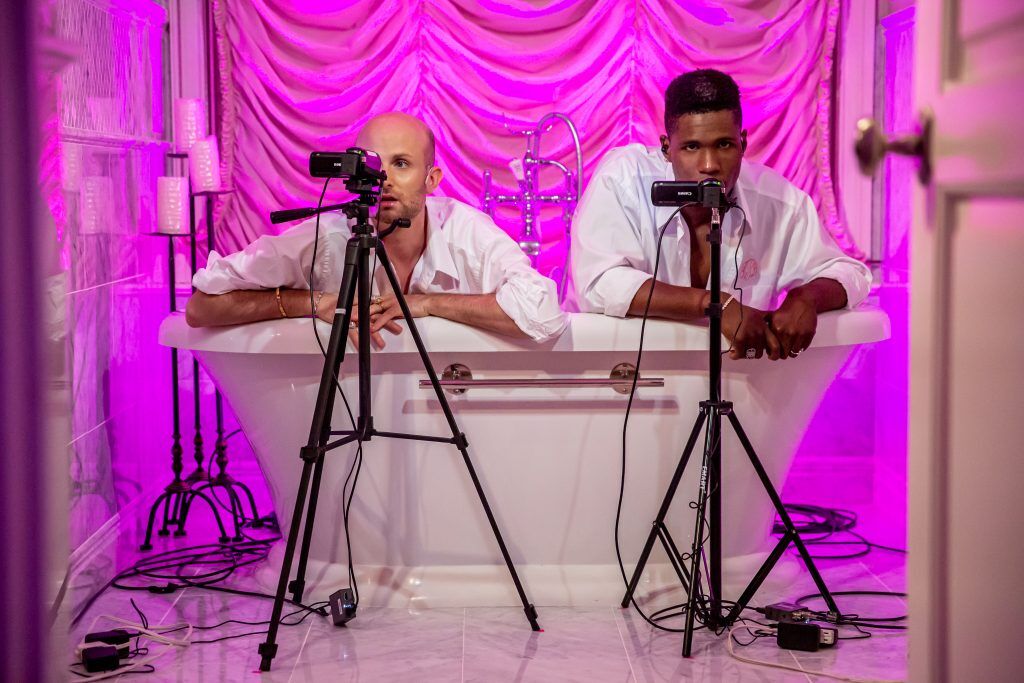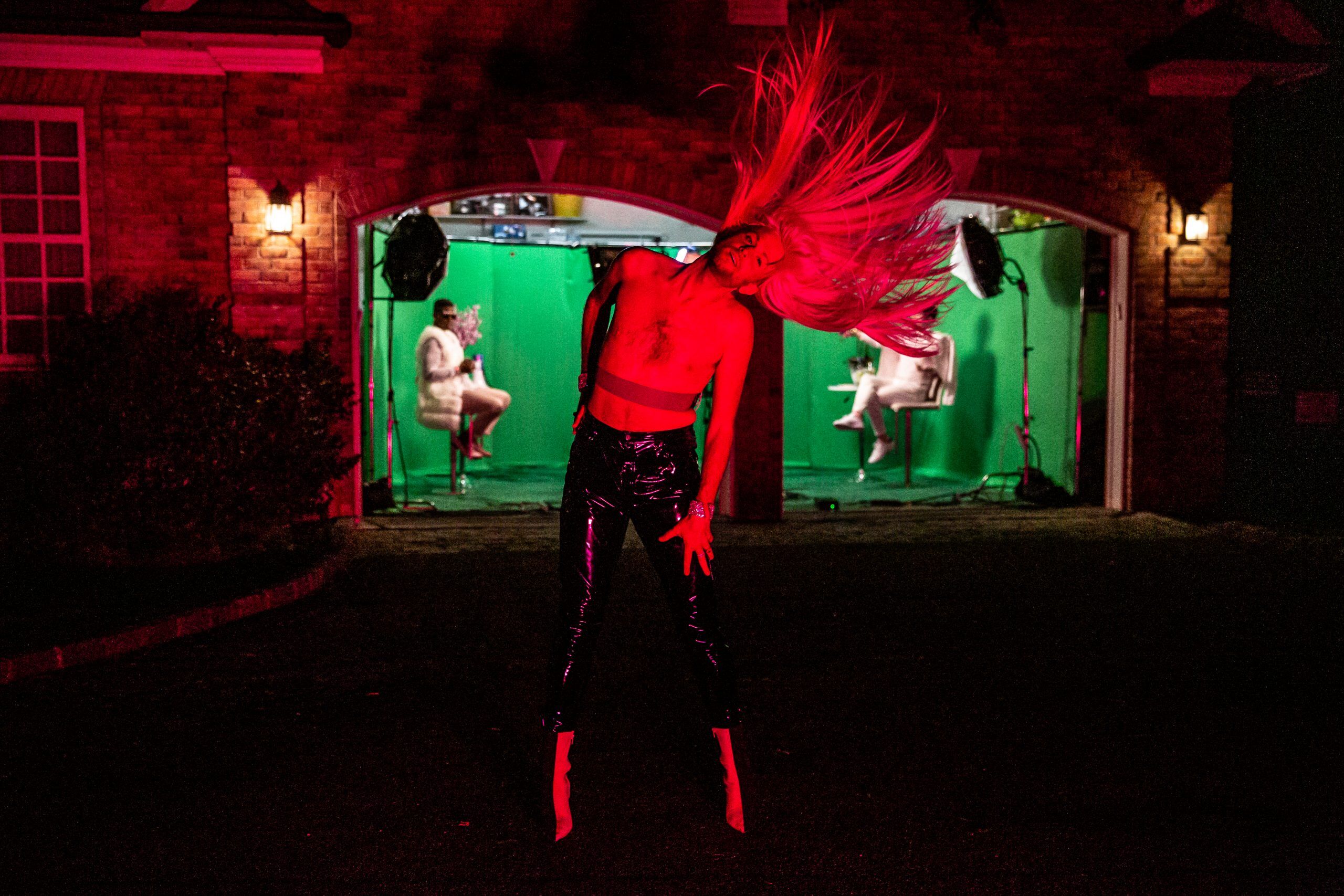“What is reality?” is a question that philosophers and housewives alike have found themselves pondering at any given moment. Each individual has their own perception of the reality of a situation and, even when documented, reality is told through a singular perspective: that of whoever commands the gaze.
This is the kind of discourse one inevitably gets into when discussing docu-fiction, reality television, and the notion of “unscripted” art. Can anything truly be real when it’s being produced? That is exactly what the Fake Friends, FourthWall Theatrical, and Jeremy O. Harris production This American Wife seeks to explore, even if it’s a question that may not have any concrete answer.

On its surface, This American Wife is simply a theatrical piece about three gay men obsessed with The Real Housewives who find themselves interacting with the cameras that surround them. The simplicity of that synopsis is betrayed almost immediately, as actors Michael Breslin, Patrick Foley, and Jakeem Dante Powell launch into a variety of performances beyond their characters (named after themselves). Each actor is simultaneously playing a heightened imitation of themselves while indulging in—and taking on—the performativity of a “Real Housewife.”
The manicured lives they perform and the façade of a gorgeous mansion that they inhabit break down just as a housewife without her Botox or a well-styled wig does when placed under duress. One could argue it’s a virtually plotless show, but isn’t that sort of what the Housewives franchise gives us? This American Wife is as sincerely enamored by every action and reaction that the Bravo series puts on screen, just as it is deeply critical of the way that the audience—often made up of gay men including Andy Cohen himself—digests and appropriates every single thing onscreen. It implies that gay men cannot physically engage in a real conversation about themselves without relying on pop culture to filter their own experiences, while taking the Housewives producers (and performers) themselves to task for the way they exploit, falsify, and withhold everything from sexual assault to domestic abuse for the sake of a compelling narrative.
While Circle Jerk felt like a subtly intentional commentary on the unpredictability of live theater, This American Wife puts imperfection on a pedestal.
This American Wife isn’t just an exquisite imitation of the shows, chock full of every catchphrase that any Housewives stan would recognize, it’s a scathing satire about the toxicity of every facet of reality television. The play acts like something of a nesting doll, with each passing scene revealing a new layer of autocritique and a distortion of what came earlier. Even its very existence is proof of this, as a recreation of an existing stage play by Breslin and Foley that has been rewritten and reformatted to address everything from the latest Housewives seasons to the whiteness of their past production, with Powell directly challenging the creators on race (something that only certain franchises of Housewives, like Potomac and Atlanta, ever engage with.)

Breslin, Foley, and dramaturgs Cat Rodriguez & Ariel Sibert have somehow created an even more dense and fascinating show than Circle Jerk. If their last virtual production was only beginning to challenge the boundaries of what live digital theater could be, this one takes it to a new level. For all the visual motifs borrowed from Housewives — from the playful mimicry of confessional aesthetics to exact recreations of popular moments intercut with GIFs and clips of said moments — the play often feels more like an experimental film. Director Rory Pelsue’s intercutting between filmed segments and live performances keeps the viewer constantly questioning what is happening in “the now” and what is pre-recorded, only further emphasizing the gap between reality and fiction that the play explores. It bounces from one camera to another, while using every single square foot of the mansion they inhabit, with one performer turning into a producer while another indulges in visual metaphor elsewhere. The play even splits the screen constantly to further show how artificiality can offer something closer to reality by simply showing more than one perspective at once.
“I don’t want realism, I want reality,” Michael Breslin said halfway through one of the play’s live performances, and maybe he’s right.
Where the live imperfections of Circle Jerk felt like a subtly intentional commentary on the unpredictability of live theater, This American Wife puts imperfection on a pedestal. Green screens stop working as if on purpose, improvised direct addresses and audience engagement via Twitter hashtags are part of the gag, and every facet of the production is designed to call out just how produced something that calls itself “real” is. Its visual prowess and cinematic flourishes come from a number of inspirations, but its best comparison point might be David Lynch’s Inland Empire; not just formally with its horrifying digital visuals and melodramatic performances but thematically in its exploration of identity and our investment in the roles we play.
One doesn’t have to have four degrees (like Dr. Wendy Osefo, Ph.D.) to understand the basics of what This American Wife is talking about, nor do they need to be able to catch every quote from fights between Kelly and Bethenny, or Teresa and Danielle, or Kim and Kyle (or, the list goes on and on), to find themselves engaged by everything thrown at the viewer. “I don’t want realism, I want reality,” Michael Breslin said halfway through one of the play’s live performances, and maybe he’s right.
Maybe that’s the real draw to This American Wife and to The Real Housewives itself. Maybe all we really want in life is to escape our own lives, down to forgetting we’ve been stuck in a pandemic, unable to indulge in frivolities like bar crawls and shopping sprees. If we can’t do it ourselves, at least we can watch our favorite housewives do it. And isn’t that good enough?♦
Don't forget to share:
Help make sure LGBTQ+ stories are being told...
We can't rely on mainstream media to tell our stories. That's why we don't lock our articles behind a paywall. Will you support our mission with a contribution today?
Cancel anytime · Proudly LGBTQ+ owned and operated
Read More in Culture
The Latest on INTO
Subscribe to get a twice-weekly dose of queer news, updates, and insights from the INTO team.
in Your Inbox













